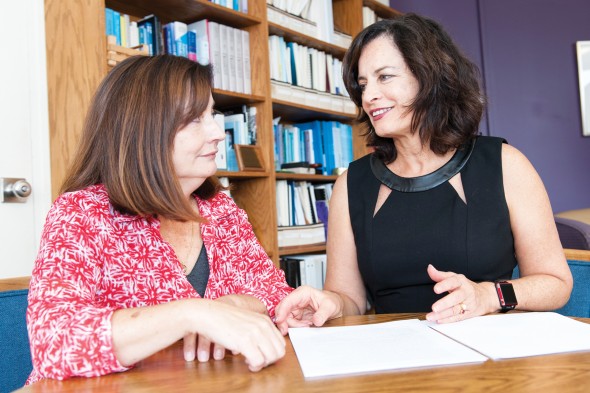Supporting family caregivers for people with disabilities

Sandy Magaña, professor of disability and human development, and department head Tamar Heller, are studying the needs of families caring for people with disabilities. Photo: Roberta Dupuis-Devlin/UIC Photo Services
There are more than 65 million family caregivers in this country helping 12 million seniors and people with disabilities live at home, saving the federal government billions each year in long-term care services.
“These caregivers aren’t getting much support in return,” said Sandy Magaña, professor of disability and human development, adding that they often suffer health and stress-related problems from the demands of providing care.
Magaña is principal investigator for a new five-year, $4.3 million grant to establish a multi-institutional center at UIC to study the needs of families caring for people with disabilities.
“By gaining a better understanding of the experiences of family caregivers — the services they use, and the needs and challenges they face — we can help set policy and research agendas that will lead to improvements in the health and well-being of individuals with disabilities of all ages, racial and ethnic backgrounds and the family members that help support them,” she said.
Support services for caregivers of the elderly and caregivers of people with disabilities are isolated from each other, she said.
“There are lots of good interventions and ideas within the aging and disability ‘silos’ that can and should be exchanged,” which would help experts devise new, combined support programs, she said.
The new Research and Training Center on Family Support will bring together experts on aging and on disabilities to guide research and to develop a national resource center.
The center is funded by the National Institute on Disability and Rehabilitation Research and the Administration for Community Living. Co-principal investigators on the grant are Tamar Heller, professor and head of disability and human development at UIC, and Joe Caldwell, director of long-term services and support policy at the National Council on Aging.
The center will conduct several major research projects over the next five years and develop a strategic plan to prioritize research for federal funding. Interviews with family caregivers will guide the agenda the researchers set for policymakers, Magaña said.
Trends in caregiving — including self-directed care, where individuals decide the services and supports they need — will be one focus of the center. Researchers will also evaluate the experiences of families using managed care.
Collaborating institutions include the Lurie Institute for Disability Policy at Brandeis University, National Resource Center for Participant-Directed Services at Boston College, RTC on Community Living at the University of Minnesota, National Alliance for Caregiving and the National Council on Aging. Organizational partners include The Arc, Easter Seals and the Sibling Leadership Network.
